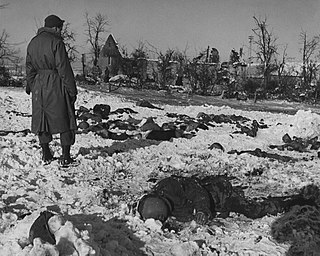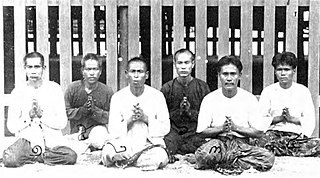In ordinary language, a crime is an unlawful act punishable by a state or other authority. The term crime does not, in modern criminal law, have any simple and universally accepted definition, though statutory definitions have been provided for certain purposes. The most popular view is that crime is a category created by law; in other words, something is a crime if declared as such by the relevant and applicable law. One proposed definition is that a crime or offence is an act harmful not only to some individual but also to a community, society, or the state. Such acts are forbidden and punishable by law.
Capital punishment, also known as the death penalty, is a state-sanctioned practice of killing a person as a punishment for a crime. The sentence ordering that an offender is to be punished in such a manner is known as a death sentence, and the act of carrying out the sentence is known as an execution. A prisoner who has been sentenced to death and awaits execution is condemned and is commonly referred to as being "on death row".

The Federal Bureau of Investigation (FBI) is the domestic intelligence and security service of the United States and its principal federal law enforcement agency. Operating under the jurisdiction of the United States Department of Justice, the FBI is also a member of the U.S. Intelligence Community and reports to both the Attorney General and the Director of National Intelligence. A leading U.S. counter-terrorism, counterintelligence, and criminal investigative organization, the FBI has jurisdiction over violations of more than 200 categories of federal crimes.

Genocide is the intentional destruction of a people — usually defined as an ethnic, national, racial, or religious group — in whole or in part. Raphael Lemkin coined the term in 1944, combining the Greek word γένος with the Latin suffix -caedo.
A hate crime is a prejudice-motivated crime which occurs when a perpetrator targets a victim because of their membership of a certain social group or racial demographic.

The International Criminal Court is an intergovernmental organization and international tribunal seated in The Hague, Netherlands. It is the first and only permanent international court with jurisdiction to prosecute individuals for the international crimes of genocide, crimes against humanity, war crimes and the crime of aggression. It is distinct from the International Court of Justice, an organ of the United Nations that hears disputes between states.

Money laundering is the process of concealing the origin of money, often obtained from illicit activities such as drug trafficking, corruption, embezzlement or gambling, by converting it into a legitimate source. It is a crime in many jurisdictions with varying definitions. It is usually a key operation of organized crime.

The Nuremberg trials were held by the Allies against representatives of the defeated Nazi Germany for plotting and carrying out invasions of other countries and other crimes in World War II.

Organized crime is a category of transnational, national, or local groupings of highly centralized enterprises run by criminals to engage in illegal activity, most commonly for profit. While organized crime is generally thought of as a form of illegal business, some criminal organizations, such as terrorist groups, rebel forces, and separatists, are politically motivated. Sometimes criminal organizations force people to do business with them, such as when a gang extorts money from shopkeepers for "protection". Street gangs may often be deemed organized crime groups or, under stricter definitions of organized crime, may become disciplined enough to be considered organized. A criminal organization can also be referred to as a gang, mafia, mob, ring, or syndicate; the network, subculture, and community of criminals involved in organized crime may be referred to as the underworld or gangland. Sociologists sometimes specifically distinguish a "mafia" as a type of organized crime group that specializes in the supply of extra-legal protection and quasi-law enforcement. Academic studies of the original "Mafia", the Sicilian Mafia, which predates the other groups, generated an economic study of organized crime groups and exerted great influence on studies of the Russian mafia, the Chinese Triads, the Hong Kong Triads, and the Japanese Yakuza.

A war crime is a violation of the laws of war that gives rise to individual criminal responsibility for actions by the combatants, such as intentionally killing civilians or intentionally killing prisoners of war, torture, taking hostages, unnecessarily destroying civilian property, deception by perfidy, wartime sexual violence, pillaging, the conscription of children in the military, committing genocide or ethnic cleansing, the granting of no quarter despite surrender, and flouting the legal distinctions of proportionality and military necessity.

Crimes against humanity are certain acts that are purposefully committed by a state, or on behalf of a state, as part of a widespread or systematic policy, typically directed against civilians, in times of war or peace. The violent nature of such acts are considered a severe breaching of human rights, hence the name. They differ from war crimes because they are not isolated acts committed by individual soldiers but are acts committed in furtherance of a state or organizational policy. The first prosecution for crimes against humanity took place at the Nuremberg trials. Initially being considered for legal use, widely in international law, following the Holocaust a global standard of human rights was articulated in the Universal Declaration of Human Rights (1948). Political groups or states that violate or incite violation of human rights norms, as found in the Declaration, are an expression of the political pathologies associated with crimes against humanity.

Crime fiction, detective story, murder mystery, mystery novel, and police novel are terms used to describe narratives that centre on criminal acts and especially on the investigation, either by an amateur or a professional detective, of a serious crime, generally a murder. It is usually distinguished from mainstream fiction and other genres such as historical fiction or science fiction, but the boundaries are indistinct. Crime fiction has multiple subgenres, including detective fiction, courtroom drama, hard-boiled fiction, and legal thrillers. Most crime drama focuses on crime investigation and does not feature the courtroom. Suspense and mystery are key elements that are nearly ubiquitous to the genre.

CSI: Crime Scene Investigation, also referred to as CSI and CSI: Las Vegas, is an American procedural forensics crime drama television series that ran on CBS from October 6, 2000, to September 27, 2015, spanning 15 seasons. This was the first in the CSI franchise, and starred William Petersen, Marg Helgenberger, Gary Dourdan, George Eads, Jorja Fox, Ted Danson, Laurence Fishburne, Elisabeth Shue and Paul Guilfoyle. The series concluded with a feature-length finale, "Immortality." A sequel, CSI: Vegas, premiered in 2021.
A violent crime, violent felony, crime of violence or crime of a violent nature is a crime in which an offender or perpetrator uses or threatens to use harmful force upon a victim. This entails both crimes in which the violent act is the objective, such as murder, assault, rape and assassination, as well as crimes in which violence is used as a method of coercion or show of force, such as robbery, extortion and terrorism. Violent crimes may, or may not, be committed with weapons. Depending on the jurisdiction, violent crimes may regarded with varying severities from homicide to harassment. There have been many theories regarding heat being the cause of an increase in violent crime. Theorists claim that violent crime is persistent during the summer due to the heat, further causing people to become aggressive and commit more violent crime.

Crime films, in the broadest sense, is a film genre inspired by and analogous to the crime fiction literary genre. Films of this genre generally involve various aspects of crime and its detection. Stylistically, the genre may overlap and combine with many other genres, such as drama or gangster film, but also include comedy, and, in turn, is divided into many sub-genres, such as mystery, suspense or noir.

A crime boss, also known as a crime lord, Don, gang lord, kingpin, godfather, or criminal mastermind, is a person in charge of a criminal organization. A crime boss typically has absolute or nearly absolute control over the other members of the organization, is greatly feared for their ruthlessness and willingness to take lives to exert their influence and profits from the criminal endeavours in which the organization engages.

Crime in the United States has been recorded since the early 1600s. Crime rates have varied over time, with a sharp rise after 1900 and reaching a broad bulging peak between the 1970s and early 1990s. After 1992, crime rates began to fall year by year and has since declined significantly. This trend lasted until 2015, where crime rates began to rise slightly. This reversed in 2018 and 2019, but violent crime increased significantly again in 2020. Despite the increase in violent crime, particularly murders, between 2020 and 2021, the quantity of overall crime is still far below the peak of crime seen in the United States during the late 1980s and early 1990s, as other crimes such as rape, property crime and robbery continued to decline. The aggregate cost of crime in the United States remains high, with an estimated value of $4.9 trillion reported in 2021.
The American Mafia, commonly referred to in North America as the Italian-American Mafia, the Mafia, or the Mob, is a highly organized Italian-American criminal society and organized crime group. The organization is often referred to by its members as Cosa Nostra and by the American government as La Cosa Nostra (LCN). The organization's name is derived from the original Mafia or Cosa nostra, the Sicilian Mafia, with "American Mafia" originally referring simply to Mafia groups from Sicily operating in the United States, as the organization initially emerged as an American offshoot of the Sicilian Mafia formed by Italian immigrants to the United States. However, the organization gradually evolved into a separate entity partially independent of the original Mafia in Sicily, and it eventually encompassed or absorbed other Italian immigrant and Italian-American gangsters and Italian-American crime groups active in the United States and Canada that were not of Sicilian origin. In North America, it is often colloquially referred to as the Italian Mafia or Italian Mob, though these terms may also apply to the separate yet related Sicilian Mafia or other organized crime groups in Italy or ethnic Italian crime groups in other countries.

Criminology is the study of crime and deviant behaviour. Criminology is an interdisciplinary field in both the behavioural and social sciences, which draws primarily upon the research of sociologists, political scientists, economists, psychologists, philosophers, psychiatrists, biologists, social anthropologists, as well as scholars of law.

A triad is a Chinese transnational organized crime syndicate based in Greater China and has outposts in various countries with significant overseas Chinese populations.















